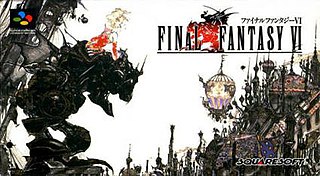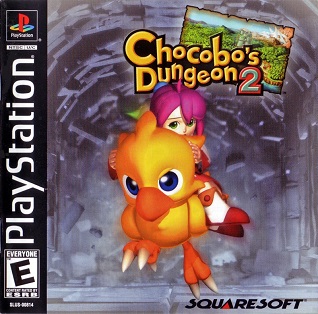
Xenogears is a 1998 role-playing video game developed and published by Square for the PlayStation video game console. It is the debut entry in the larger Xeno franchise. The gameplay of Xenogears revolves around navigating 3D environments both on-foot and using humanoid mecha dubbed "Gears". Combat is governed by a version of the turn-based "Active Time Battle" system. The story follows protagonist Fei Fong Wong and several others as they journey across the world to overthrow the all-powerful rule of Solaris and uncover mysteries concerning their world. The story incorporates Jungian psychology, Freudian thought, and religious symbolism.

Final Fantasy VI, also known as Final Fantasy III from its initial North American release, is a 1994 role-playing video game developed and published by Square for the Super Nintendo Entertainment System. It is the sixth main entry in the Final Fantasy series, the final to feature 2D sprite based graphics, and the first to be directed by someone other than series creator Hironobu Sakaguchi; the role was instead filled by Yoshinori Kitase and Hiroyuki Ito. Long-time collaborator Yoshitaka Amano returned as character designer and concept artist, while composer Nobuo Uematsu returned to compose the game's score, which has been released on several soundtrack albums.

Final Fantasy V is a 1992 role-playing video game developed and published by Square. It is the fifth main installment of the Final Fantasy series. The game first appeared only in Japan on Nintendo's Super Famicom. It has been ported with minor differences to Sony's PlayStation and Nintendo's Game Boy Advance. An original video animation produced in 1994 called Final Fantasy: Legend of the Crystals serves as a sequel to the events depicted in the game. It was released for the PlayStation Network on April 6, 2011, in Japan. An enhanced port of the game, with new high-resolution graphics and a touch-based interface, was released for iPhone and iPad on March 28, 2013, for Android on September 25 the same year and for Windows on September 24, 2015. A more enhanced re-release of the game as part of the Final Fantasy Pixel Remaster series, was released on November 10, 2021 for Android, iOS, and Windows, for Nintendo Switch and PlayStation 4 on April 19, 2023, and for Xbox Series X/S on September 26, 2024.

Final Fantasy III is a role-playing video game developed and published by Square for the Family Computer. The third installment in the Final Fantasy series, it is the first numbered Final Fantasy game to feature the job-change system. The story revolves around four orphaned youths drawn to a crystal of light. The crystal grants them some of its power, and instructs them to go forth and restore balance to the world. Not knowing what to make of the crystal's pronouncements, but nonetheless recognizing the importance of its words, the four inform their adoptive families of their mission and set out to explore and bring back balance to the world.

Chocobo Racing is a racing game developed and published by Square for the PlayStation, A spin-off of the Final Fantasy series and part of the Chocobo spin-off series. It was released in Japan in March 1999, followed by North America and Europe in August and October, respectively. The game's star and namesake is the Chocobo, with other figures from the Final Fantasy series, such as Mog the Moogle, the Black Mage, and Cid being part of the cast. Most of the game's soundtrack is composed using songs from previous Final Fantasy titles. As a formulaic kart racer, Chocobo Racing is often compared to Mario Kart and Crash Team Racing.

The Chocobo is a fictional species created for the Final Fantasy franchise by Square Enix. A galliform bird commonly having yellow feathers, they were first introduced in Final Fantasy II (1988), and have since featured in some capacity in nearly every Final Fantasy title, usually as a means of transport. Chocobos or chocobo-themed characters have played story roles in multiple titles, notably in Final Fantasy V and XIII. A recurring Chocobo also acts as protagonist of the Chocobo spin-off series.

Moogles are a fictional species of diminutive, sentient creatures and a recurring element of the Final Fantasy video game franchise, starting with their initial appearance in Final Fantasy III. They also appear in the Mana and Kingdom Hearts series. Moogles serve a variety of purposes in the various games in which they appear. They sometimes provide opportunities to record game progress or access shops; occasionally they assist in battle or may even become a playable character.

Masashi Hamauzu is a Japanese composer, pianist, and lyricist. Hamauzu, who was employed at Square Enix from 1996 to 2010, was best known during that time for his work on the Final Fantasy and SaGa video game series. Born into a musical family in Germany, Hamauzu was raised in Japan. He became interested in music while in kindergarten, and took piano lessons from his parents.
Final Fantasy is a media franchise created by Hironobu Sakaguchi and owned by Square Enix that includes video games, motion pictures, and other merchandise. The series began in 1987 as an eponymous role-playing video game developed by Square, spawning a video game series that became the central focus of the franchise. The music of the Final Fantasy series refers to the soundtracks of the Final Fantasy series of video games, as well as the surrounding medley of soundtrack, arranged, and compilation albums. The series' music ranges from very light background music to emotionally intense interweavings of character and situation leitmotifs.

Tobal 2 is a 3D fighting video game developed by DreamFactory and released by Square in Japan in 1997. It is the sequel to Tobal No. 1. The game was re-released in 2007 under Square Enix's "Legendary Hits" label.

Chocobo's Dungeon 2 is the 1998 role-playing video game by Square for the PlayStation. It is the sequel to 1997's Chocobo's Mysterious Dungeon.
Mystery Dungeon, known in Japan as Fushigi no Dungeon, is a series of roguelike role-playing video games. Most were developed by Chunsoft, now Spike Chunsoft since the merging in 2012, and select games were developed by other companies with Chunsoft's permission. The series began when co–creator of Dragon Quest, Koichi Nakamura, was inspired by Seiichiro Nagahata's experience with Rogue, who is also a fellow developer from the company, and a desire to create an original series. It began on the Super Famicom, progressing to almost all of Nintendo's and Sony's home and handheld consoles, WonderSwan, Dreamcast, Windows, and mobile devices.

Final Fantasy Fables: Chocobo's Dungeon is a 2007 role-playing video game published by Square Enix for the Wii. It is an installment in the Chocobo series that focuses on Chocobo and his quest to free a town lost in time from eternal forgetfulness. It is a loose sequel to Chocobo's Dungeon 2 on the PlayStation.
The Chocobo video game series is a spin-off series composed of over a dozen games developed by Square Co. and later by Square Enix featuring a super deformed version of the Chocobo, a Final Fantasy series mascot and fictional bird, as the protagonist. Several of the titles have received separate album releases of music from the game. The music of the Chocobo series includes soundtrack albums for the Chocobo's Mysterious Dungeon sub-series—comprising Chocobo's Mysterious Dungeon, Chocobo's Dungeon 2, and Final Fantasy Fables: Chocobo's Dungeon—and soundtrack albums of music from Chocobo Racing, Final Fantasy Fables: Chocobo Tales, and Chocobo and the Magic Picture Book: The Witch, The Maiden, and the Five Heroes, as well as an album of arranged music from Chocobo's Mysterious Dungeon and a single entitled Chocobo no Fushigina Dungeon Toki Wasure No Meikyuu: Door Crawl for the theme song of Final Fantasy Fables: Chocobo's Dungeon.
The Chocobo series is part of the Final Fantasy franchise owned by Square Enix. A spin-off series meant to have more child and casual gamer appeal than the main games, it spans multiple genres, beginning with Chocobo's Mysterious Dungeon in 1997. It features a recurring cast of characters designed by Toshiyuki Itahana and rendered in a more chibi style than traditional Final Fantasy games. They include Chocobo, the protagonist and a member of the fictional chocobo species of flightless birds; Mog, a moogle who is Chocobo's friend, Shirma, a white mage, and Croma, a black mage, among other recurring series characters. One of the most major genres within the series are Mystery Dungeon games, while it has also branched off into tabletop games. Its most recent entry is Chocobo GP, a kart racing game released in 2022 for the Nintendo Switch.











